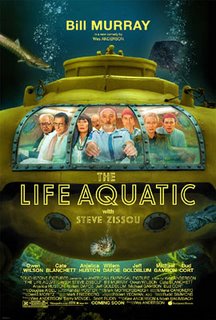 The Life Aquatic With Steve Zissou
The Life Aquatic With Steve Zissou I saw this when it opened around Christmas 2004, but The Girl wanted to stay in and rent a movie Friday night instead of going to see Art School Confidential, so we went with this. Normally I wouldn't say anything about a movie I've seen before here, but since the first time around I had the same feelings that just about every reviewer had (namely that Anderson had gone as far as he could with the quirkiness and irony and was sliding into vanity) and the second viewing gave me a new appreciation (and because it's 3am and I can't sleep), here goes.
It's easy to look at this and think that Anderson was on auto-pilot during production; the quirkiness and characterizations are almost formulaic by now, but that's become part of the appeal. The only real criticism that can be leveled at Anderson is that he showed up at prom two years in a row with the same dress but, damn it, he still looks better in it than all the other girls.
Paying closer attention to Murray as Zissou was the key to unraveling the real beauty of the picture. Zissou is a perpetual adolescent oceanographer of dubious skill who funds his childish lifestyle and fascinations by making movies. He can be a spoiled brat; He always insists that things be done his way, pouts and retreats to a corner to smoke pot when it doesn't, and generally preens and showboats throughout the entire picture despite looking like a total buffoon at every turn. But he's also a leader, taking a group of "strays" and forging ahead from one adventure to the next while inspiring loyalty and confidence in his crew. In short, he's Wes Anderson.
Anderson's movies have all had a childlike fantasy quality to them. The sets and costumes are dated to the period of Anderson's childhood, despite the stories being set in modern times (look at the dates on the headstones in The Royal Tenenbaums if you don't believe me) and the visuals have an almost 2D, storybook feel to them (major points to The Girl for noticing and pointing that out). The themes that run through all of his films have focused on childhood, childishness, and the burden of growing up, especially when concerning the main or dominant character. Bottle Rocket centered around three young men who share a childish fantasy of a life crime. None of them want to grow up, all of them want something better, and in their immaturity becoming criminals is the only logical step to avoid having to get real jobs and live in the real world. Rushmore brings us Jason Schwartzman as Max Fischer, who Anderson also seems to have a lot in common with, a kid who's too smart for his own good and is constantly on the verge of failing out of school because he would rather focus on a plethora of disparate extra-curricular activities, including writing and producing his own plays, than his studies. He befriends some of his classmates' father (Bill Murray in the role that would set him on the road to being a serious actor) and subsequently engages him in constant oneupmanship for the affections of a teacher at the school. The Royal Tenenbaums focuses on a dysfunctional family who's patriarch abandons his wife and children in pursuit of his own interests while the children, once considered geniuses, languish in obscurity as their talent and drive are nullified by the passing years and the onset of adulthood.
Which brings us back to The Life Aquatic. While a lot of it can be seen as the same old same old, this time around Anderson shows more maturity in his scripting and characterizations. Murray's performance hits all the right notes, balancing precariously between his childlike wonder and fantasies and the burden of becoming an overgrown brat. Anderson himself, in interviews and DVD featurettes, comes off as the same kind of guy. Making movies is the ultimate method of putting off adulthood, and Anderson knows it. That's why he does it, and that's why his movies have that certain feeling to them. But at the same time it's a serious business and with his continued success and growing budgets he has to grow more and more responsible while still keeping that sense of childish wonder. I'm sure it's a burden to have to grow up while not growing up, and in Zissou we see that. The responsibilities and consequences of that life are clearer in this picture than in any of the others, and it gives it a more introspective feel and a sense that Anderson is growing inside of his own world. There's still plenty of Wes Anderson here, but, as the closing shot of Murray hoisting a young fan on his shoulders and carrying him along perfectly symbolizes, there is an older, wiser, and, sadly, wearier Wes Anderson supporting it.


1 Comments:
damn. that may be the best review of that I have ever read.
Post a Comment
<< Home